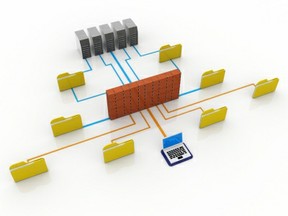
Open Source Value
by Michey
Open source is as older than the Internet, it has a tremendous value, but is not coming without controversies, misunderstanding and even oppositions.
Introduction and Definitions
 Open source is a development method that promotes access to the product's source for better quality, reliability, flexibility; enabling a self-enhancing diversity of models, communications, and interactive communities.
Open source is a development method that promotes access to the product's source for better quality, reliability, flexibility; enabling a self-enhancing diversity of models, communications, and interactive communities.
I think the confusion starts right here, the definition is too generic.
Open-source is not just "giving away the source code", according with deep thinkers is more a philosophy of sharing Information Technology.
Open source software is software whose source code is published and made available to the public, enabling anyone to copy, modify and redistribute the source code without paying royalties or fees. (Wikipidia definition)
The Open Source Initiative (OSI) is a non-profit organization which educate and advocate the benefits of open source, creates standards, approves Licenses, so they create the necessary trust for developers, users, corporations and government, putting the entire methodology under a unique umbrella and creating the rules.
Another trust info source is TechRepublic covering the Linux and Open Source movement.
History of Open Source
 Why we need the history? I believe that knowing history we understand better the present and we prepare ourselves for the future.
Why we need the history? I believe that knowing history we understand better the present and we prepare ourselves for the future.
Also I believe that is applicable all over, including Information Technology (IT).
Prior to the Internet era:
- IBM gave us source releases of its operating systems and other programs starting in 1950
- SHARE user group created the first repository to facilitate the exchange of software
Open source on the Internet era began from the infancy stage of our beloved Internet, and exploded with the apparition of
Web sites which were the first form of information sharing with the world. We call those static Web sites or Web 1.0.
The rule was that each author of a website was the owner... you could read my site but didn’t dare to touch it, only I, the author, was able to update, delete, maintain and decide what to put in my site.
This is why we called them static Web Sites.
 The term “open source” was suggested by Christine Peterson and adopted by some people in the free software movement at a session held at Palo Alto, California conference. It was an overwhelming response and the word was spread with the help of Linus Torvalds, Phil Hughes and many more.
The term “open source” was suggested by Christine Peterson and adopted by some people in the free software movement at a session held at Palo Alto, California conference. It was an overwhelming response and the word was spread with the help of Linus Torvalds, Phil Hughes and many more.
In 1998 Netscape announced the source code release for Navigator.
Web 2.0 and 3.0 added new tools: networking, bookmarking, blogging, mobile devices, the cooperation between members of comunities was the new name of the game and the result was that we replace the static Web Sites with dynamic Web sites.
Now is still my site but friends or associates can write posts on my blogs, add videos, comments, my site is a collective effort now.
The idea of Open Source blossomes as a direct consequence of Internet evolution.
In 2003 the Open Source Initiative (OSI) was created, and they introduced standards.
The evolution of the Open Source software has been spectacular.
You already know and use WordPress. The themes and plug-ins we love are part of the open source process, and part of overall WP success.
Everybody can create a new plug-in or theme and donate to WP for people around the world to use it. If is not a quality product, the community will react and the author will improve his product. it it is a great product, many will use it and his ratings will sky rocket. It is clear that the community will decide if the author is doing a quality work.
A relatively new example is “applications for mobile phones", and the widgets.
It is almost impossible for me to give you a complete list of Open Source software now, but I’ll give you a short list to make my point of Open Source evolution.
Examples of Open Source Software
From a long list I choose a small list to show the importance, the whild spread, the top standards of the Open-Source concept:
- Computer software:
- PHP - a scripting programming Language used on web design
- PYTHON - a general purposr Programming Lamguage
- GNU Project - is a free software and mass collaboration project, developed in 1984, by Richard Stallman at MIT
- Linux - operating system on Unix
- NetBSD and OpenBSD - operating systems derived from Unix
- OpenSolaris - Unix Operating System from Sun Microsystems
- Symbian - real-time mobile operating system
- Servers:
- Apache, Tomcat web server
- MediaWiki - the server software that runs Wikipedia
- Alfresco, RenovatioCMS, Joomla, Drupal - all are Content Management Systems (CMS)
- WordPress - blog software
- Eclipse - software development called (IDE), an Integrated Development Environment
- Client Software:
- osCommerce - ecommerce
- NASA World Wind - virtual globe, geobrowser
- Mozilla Firefox - web browser
- Mozilla Thunderbird - e-mail client
- OpenOffice.org - office suite
- Science:
- Science Commons - an alternative to the expensive legal costs of sharing and reusing scientific works in journals
- Open Source Science Project - created for students to increase the ability of participating in the research process
- Other, the list is very long, I give you my favorite:
- Open design - applying open source methodologies to the design of systems to physical products
- GIMP - is the GNU Image Manipulation Program, a freely distributed piece of software suitable for photo retouching, image composition, image authoring
- Teaching - applying the concepts of open source to improve learning, organizational, and management challenges
- Open Source Courseware - is the Java Education & Development Initiative (JEDI)
- Open Source Appropriate Technology - the use of classroom projects at the university level
 I know is boring, but I hope you got the idea of how extended is the Open Source nowadays.
I know is boring, but I hope you got the idea of how extended is the Open Source nowadays.
I like the Tim O’Reilly quote:
“The future is here. It’s just not evenly distributed yet.”
Distribution of the Open Source Software
The Standards create by Open Source Initiative.
 As I already stated, the OSI was created to educate, encourage the use of Open Source Software but also to create the standards and to determine whether or not a software license can be considered Open Source.
As I already stated, the OSI was created to educate, encourage the use of Open Source Software but also to create the standards and to determine whether or not a software license can be considered Open Source.
Once upon a time, Open source software has a stigma attached to it, this is NOT the case nowadays and we have to thank OSI for its work.
To consider a "product/program" Open Source, this must follow OSI Standards and be approved by OSI as Open Source.
Which are the mysterious standards:
- Free Redistribution - the license will guarantee a free distribution, will not require a royalty or other fees
- Source code - the license must allow distribution in source code as compiled form
- Permission of Derived Works - the license must allow modifications and derived works and must allow them to be distributed under the same terns as the license of the original software
- Integrity of the Author's Source Code - the license may required derived works to carry a different name or version number from original author software
- No Discriminations Against Persons, Groups, Communities, Platforms
- No Discriminations Against Fields of Endeavor - the license must not restrict the software in a specific Fields of Endeavor like business, research and so on
- The Distribution of License - The rights attached to the Software must apply to all to whom the Software is distributed without a need of a new license
- License Must not be Specific to a Product - the rights attached can be for an entire program, and its distribution can be done as a program as well
- License Must not Restrict Other Software - License Must not place restrictions on other software that is distributed along with the licensed software
- License Must Be Technology Neutral
This is in a nut shell the conditions under a Software will be decided by OSI that it is or it is not an OPEN SOURCE.
Myths, Misconceptions, and Confusions
 The term “free software” produces the most misinterpretation.
The term “free software” produces the most misinterpretation.
With the definitions as “software you can get for zero price,” or “software which gives the user certain freedoms.” you know where I am getting now... it is too vague.
Every proposed definition for “free software” has some kind of semantic problem in Enghish and this includes “open source software”.
As a result, good people from the free software movement and the open source often try to work together on practical projects such as software development.
The main initial motivation of those who hate the open source free software movement was that the ethical ideas of “free software” made some people uneasy.
That's true but the opposite is true as well. Some people love and grab everything which is free, others are really suspicious about "free staff'. I don't know a easy solution to this dilemma, I think we shall become more educated consumers, and then right vs. wrong will be obvious.
Books About Open Source
 |  |  |
| Working in Public: The Making and Mai... Stripe Press | Open (Source) for Business: A Practic... Independently published Only $20.0 | Open Source CreateSpace Independent Publishing Pl... |
 |  |  |
| OSINT Techniques: Resources for Uncov... Independently published Only $41.41 | Deep Dive: Exploring the Real-world V... Wiley Only $27.0 | The Open Source Intelligence Guide: H... Independently published Only $12.99 |
Do you Wizzley?
You might also like
Benefits of Web 2.0No matter if you own your own website, working on Web 2.0 can bring you signi...
50 Articles on Wizzley: Things I’ve Tried, Learned and MasteredAfter writing 50 articles on Wizzley, I've gained a lot of knowledge on the p...




 Support Desk For Your Businesson 01/09/2012
Support Desk For Your Businesson 01/09/2012
 Google's Hangouts Exampleon 11/16/2011
Google's Hangouts Exampleon 11/16/2011
 Google and ZMOTon 10/21/2011
Google and ZMOTon 10/21/2011
 Steve Jobs Lost the Battleon 10/05/2011
Steve Jobs Lost the Battleon 10/05/2011


What Is Your Opinion About "Open Source"?
Yes OpenOffice, Gimp, Wordpress and so on, are freeware but with a licence, so nobody will accuse you that you use them, nor if you feel to add staff to improve them you can do it.
You have explained this techy stuff very well to a non-techy person!
Is this also referred to as "freeware?"
You are right. Open Office is a great open source, the other one is Worldpress if you have a blog, also Gimp if you need to create graphics. So we already have an arsenal of tools we use without to even think about the value of the open source.
Thanks for reading my post.
I know that "free staff" is misused, so I try to clarify the other face of the coin, free staff which is legal, because it has a license, given by a organisation qualified to give licenses. I cannot put the URL of OSI because they are in the middle of changing their server, as soon as they give us the new URL I'll posted as well.
Thanks you for stopping by
I was delighted to see a few names I recognized on that list. I was not well-informed at all about Open Source and your words are very helpful.
Thank you Keem, it is interesting because we must make a distinction between the general concept of "Free staff" on Internet and the "Open Source Software" which is free but with a license... So I was thinking that giving more information will help.
All The Best
M.
I'm an un-nerd, Michey, but this is interesting stuff. :)
Thanks Kevin and Jeanie
Jeanie take it easy and you do it in your time frame and schedule. This is the best way to work, I wish I can afford to do the same...
Thanks for reading my post
This new website seems to be much easier to use and display...we all probably needed a change...I have Devin all day every day this week so I don't have time to develop anything...will have her part of the week next week, as well, and Bill will be home on Wednesday...so I don't know when I will get back here. LOL
Loads of information and excellent, as always!!